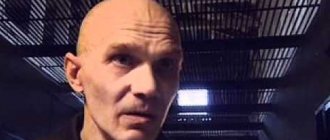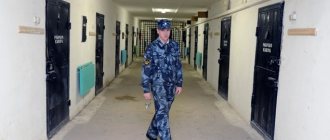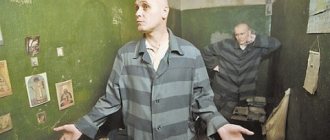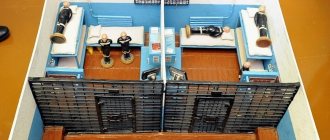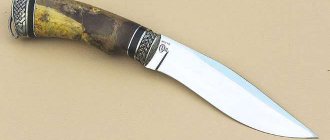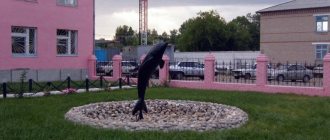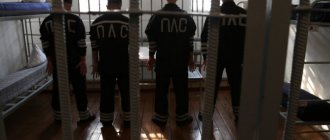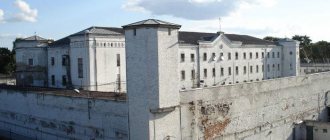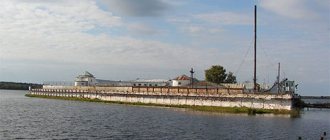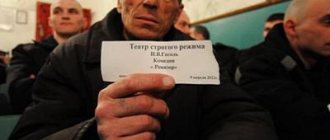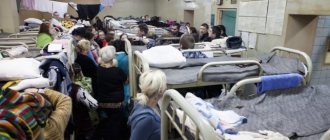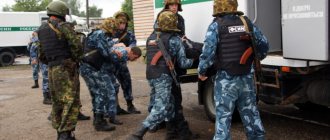In Russia there are a large number of colonies, known not only in the Russian Federation, but also abroad for their cruel conditions of detention. These include FKU OIK-2 OUCD GUFSIN of Russia in the Perm Territory in the city of Solikamsk or, as it is also called, the White Swan colony.
This article will discuss the main points related to the characteristics of this place of deprivation of liberty (MPS), namely: regime, location, address and main contacts, infrastructure, daily routine, main features and much more.
Brief description of the Solikamsk special regime prison
The White Swan prison is located at Perm Territory, Solikamsk, st. Karnalitovaya, 98 (index – 618545).
Email addresses:
Mode: special.
Telephones and faxes of the main persons for receiving citizens on personal matters are presented in the table:
| Full name, position | Phone number | Business hours |
| Khomko Viktor Konstantinovich, head of the colony | 8-342-537-21-36 | Wed, from 15:00-16:00 |
| Ignatiev Sergey Aleksandrovich, deputy head | 8-342-537-21-93 | Tue, from 15:00-16:00 |
The colony has its own page in the GUFSIN of Russia for the Perm Territory - https://59.fsin.su/structure/ik_2.php. She also has many different unofficial sites and groups on the Internet :
- Prison "White Swan" VKontakte (https://vk.com/jail_white_swan).
- “White Swan” in Chanson Solikamsk (https://vk.com/club48835080).
Map - how to get there
Visiting room opening hours
| Monday | 08.00-17.00 | Lunch 13.00-13.48 |
| Tuesday | 08.00-17.00 | Lunch 13.00-13.48 |
| Wednesday | 08.00-17.00 | Lunch 13.00-13.48 |
| Thursday | 08.00-17.00 | Lunch 13.00-13.48 |
| Friday | 08.00-16.00 | Lunch 13.00-13.48 |
| Saturday | 08.00-17.00 | Lunch 13.00-13.48 |
| Sunday | 08.00-17.00 | Lunch 13.00-13.48 |
Infrastructure
The colony is located almost in the center of the city of Solikamsk. It is surrounded by ordinary shopping complexes, houses, and playgrounds. It itself is surrounded by a high concrete wall with barbed wire and bars on the windows. The capacity of the colony is 510 places.
Initially, the colony was built in such a way that it was impossible to escape from it. The entire territory is surrounded by surveillance cameras, guarded by military personnel and 50 guard dogs that do not allow anyone except their owners to approach them.
On the territory of the colony there is:
- church;
- library;
- a small stall where you can buy food and basic necessities.
There are also several large white brick barracks, as well as a headquarters for the barracks workers. The area is surrounded by a concrete wall with barbed wire. There is also a furniture production workshop.
On the territory of the colony they grow vegetables and engage in animal husbandry . In the courtyard of the colony there are monuments to swans, even urns are made in the shape of these birds.
To get to the criminals' cells, you need to go through many corridors with bars on the doors. There are also cameras everywhere inside.
To be slaves for 75 rubles. What you need to come to terms with in order to get parole
Radio Liberty continues to talk about slave labor in Russian correctional institutions. A prisoner of the men's penal colony-settlement No. 21 in the Perm Territory, who has several years left before his release, describes how convicts work and live here, and explains why some of them sometimes dream of being transferred to ordinary general regime colonies with formally more strict rules.
In our publications, we have repeatedly talked about slave labor in Russian penal colonies. In December 2022, the head of IK-14 in Mordovia, Yuri Kupriyanov Nadezhda Tolokonnikova served part of her sentence in this colony , and told the whole of Russia about the terrible conditions of exploitation of prisoners. Following this, the Idel.Realii project published several stories of women who were serving sentences in the same correctional institution. Impossible production standards, 16-hour working days, violence, disregard for the health of prisoners - you can read about all this in these articles on our website (, , , ) along with an interview with Tolokonnikova herself (the series of publications will be continued).
See also
“The dead were written off.” Nadezhda Tolokonnikova - about the Mordovian colonies
After one of the articles about slave labor in Mordovian IK-14, a prisoner from colony-settlement No. 21 in the Perm Territory wrote to the editors of Radio Liberty. It is located 50 kilometers from the city of Gubakha, 10 from the urban village of Ugleuralsky and 100 kilometers from Berezniki, where another Pussy Riot member, Maria Alekhina . The author of the letter complained about slave-like working and detention conditions, similar to those mentioned in the stories about the women's penitentiary-14.
Colonial settlements (CP) are considered the mildest type of real imprisonment: prisoners are allowed to leave the colony, look for work on their own (every prisoner in a CP is required to work or study), they can even live here with their family. In practice, everything is far from so rosy. Firstly, settlement colonies are divided into two main types, and the conditions of detention of prisoners in these two types of colonies are very different from each other. The first type, penal colony for those serving a sentence for the first time or those who committed a crime through negligence, has more lenient conditions - especially if the colony is located in a relatively large populated area. The second type of colony-settlement (there are many times fewer of them) is a penal colony for those who have previously served their sentences. Prisoners who have served part of their sentence in a regular general regime colony are transferred here.
In colony settlements you will not see towers with armed guards. However, the conditions of detention for prisoners here are in some ways more stringent than in general regime colonies
KP-21, where the prisoner contacted us, is one of these. It is located in the middle of dense forests in the village “10th kilometer”. The camp center appeared here in 1959 - to use the labor of prisoners in logging and to maintain the railway line along which the felled timber was exported. As follows from the historical information on the website of the Perm department of the Federal Penitentiary Service (FSIN), at that time in the village, in addition to the colony itself, there was a transit point, a brick factory, a store and a kindergarten. Both then and now, KP-21 is actually an isolated labor camp in the middle of the forest.
Despite the fact that transfer to a settlement colony is considered by the Federal Penitentiary Service as an encouragement (it is easier to be released from a penal colony on parole), sometimes these correctional institutions in reality have a much stricter regime than ordinary colonies. Svetlana Sidorkina , a lawyer for the international human rights group Agora, told Radio Liberty , the leadership of the settlement colonies takes advantage of the fact that prisoners are ready to endure almost anything for the sake of a speedy release. However, this patience also has its limits. “In my practice, there was a case when a prisoner of a colony-settlement in the Tver region deliberately violated the regime so that he would be sent back to a regular colony,” says Sidorkina.
A prisoner from colony-settlement 21 in the Perm region, who contacted our editorial office, cannot afford such luxury. In the previous colony, he constantly wrote complaints about his superiors to higher authorities and is now sure that if he returns, he will face revenge from the leadership. About six months after arriving at KP-21, our interlocutor complains about the same slave labor that flourishes in Mordovian IK-14. His salary for a working day of 9–10 hours without days off is 75 rubles per month after deducting the expenses of the Federal Penitentiary Service for the cost of food, clothing and utilities.
This man, who asked not to give his name so as not to be subject to penalties from the management of KP-21, sent us several pay slips - his own and those of other prisoners. The amounts vary from 75 to 400 rubles and depend on the number of hours worked, although in fact, he says, almost all prisoners work seven days a week and after school hours - if the authorities need it. 75 rubles a month is not a record for the Federal Penitentiary Service. “Sometimes I got 29 rubles,” Nadezhda Tolokonnikova told Radio Liberty. This is common, although it is illegal, of course, to deduct so much. They have the right to deduct under the Criminal Code (Criminal Executive Code - RS note), but the maintenance costs are not so high.”
Bad reviews about colony-settlement No. 21 can also be found on the forums of relatives of prisoners. Here's just one of them:
“The city of Gubakha, the village of the 10th kilometer, God forbid someone ends up there. Girls, I’ve been reading you for three days, I accidentally came to the forum... I understand very little about this, but I know it first-hand. Mine is sitting in a really high security settlement, from there the prisoners who are released from the general population are trying to get back by all means. It’s absolute hell there, I visited him twice for a DS (long date – RS note), I didn’t recognize him. They plow there like horses for 11 hours straight and seven days a week, and you can’t even sit down for the slightest offense - for example, you smoked in the wrong place and the young cop doesn’t like it - in the punishment cell (punishment cell - Note RS). There’s a lot of things that can’t be told right away… but as for parole and no hope, even without penalties…. The cops checked the DS 20 times a day (and night), and they were also rude.”
This description matches what one of the prisoners at KP-21 told us over the phone. Our interlocutor served more than 5 years in a general regime colony for robbery. Now he only has a few years left to serve in prison, but this man expects to be released on parole in July-August 2022.
“I was transferred in the fall from a regular colony. I thought it would be easier, but if you compare it with [names the region from where he was transferred to the Perm Territory], it was more civilized there, at least some laws were observed. I came here and they didn’t give me any work clothes, or even bed linen, although I think the money is all written off for that. What I brought was what I went to work with. Okay, I still had my own, but sometimes people come and they have nothing at all. It is not customary to give anything away here. We dismantle old houses, unload potatoes, all this every day, no matter - rain, snow, weekend. There are no days off here at all. Sunday is not considered a day off, let alone Saturday. All days are working days.
Sunday is not considered a day off, let alone Saturday
– Have you been given a day off at least once since the fall?
- What for? Who will work then?
– How many hours does the working day last?
– From 8 am to evening. Right now, for example, there is a blizzard, snow. In the morning we left at about 7 o'clock and went to clear the snow. They cleared the snow, came, had lunch, and went back to clearing. The car arrived, which needs to be unloaded, so let’s go again. The main load is until 5 pm, but even later some car may arrive, for example, with groceries. It was autumn: a car arrived with 20 tons of potatoes. It doesn't matter that you worked all day. Everyone again goes to unload, like real slaves.
– How much do they pay for such work?
– The first time, in the fall, when I arrived, I received 80 rubles. And so since then. Everyone else too.
– What can you buy in the settlement with this money?
- A pack of cigarettes.
– How do people live on this money?
- Someone is receiving transmissions. But the majority of people who have no one live like this. The way they used to live, in Soviet times, in such places, is the way they live now.
Colony-settlement, Volgograd region
- What else do you do for this salary?
- All housekeeping work. Remove, wash.
– Is there another job in the village?
– 40 of our settlers work for the “private owner”: they collect pallets, saw them themselves, and pack them themselves. Their salary is on average 900 rubles or a little more, but they work very hard. The “private trader” pays money for each convicted person to the colony authorities. How many - I don’t know about this, but the authorities are very interested in this object, because people are sent there to work in the first place. There is also a depot: this is where cars are loaded and cleaned after unloading. Our settlers also work there, about 10 people, they are taken there every day in a company car. They also work for a “private owner”, also for pennies. As far as I know, if we work, we should all receive the minimum wage according to the law, which in the Russian Federation averages 11 thousand rubles. But in this colony, as far as I know, the minimum wage out of 140 people receives no more than 20. All the rest work as they have to and live on what God sends.
– Is it considered lucky for you to get a job for 900 rubles a month?
- No. Firstly, they work from morning to night. Everything was done by hand, with hammers in hand, and there were a lot of injuries.
– Did any of the prisoners try to complain?
Here it’s easy to put pressure on the fact that they can be sent back to the colony
- This is a colony-settlement. Here it is easy to put pressure on the fact that they can be sent back to the colony where you came from. They manipulate people. Why do people come here? To free yourself faster. And those who start to complain can easily be put in isolation and sent back.
– Have there been such cases since the fall, when you moved here?
– They were as if they weren’t. That's why the rest sit silently.
– Not everyone has the same health and age. Do they give concessions to those who are weaker?
– Yes, they can give you easier work, but also for the whole day. There is no way to sit and relax.
– If you get sick or injured, what should you do?
– There is a medical center, but they have almost no medicine. They don't give exemptions either. They will say: write an explanatory note. And no one wants to write explanatory notes so that a violation is not given. Still, here they want to be released on parole. Therefore, whether you want it or not, the sick, the oblique, the lame, you have to work.
It’s like this: either you walk or you lie down
- With a work schedule of 7 days a week, and even considering the hard physical work, health problems simply cannot but arise.
“If it’s something really serious, they’ll take you to the hospital.” There was an incident at a woodworking factory recently. They pound these pallets with their hands all day long, until their legs give way. Our driver worked transporting timber, and recently he was also taken away with pneumonia. No examinations, nothing. It’s like this: either you walk or you lie down.
And this is how the FSIN administration in the Perm Territory boasts about the results of the labor of prisoners:
– Do the colony authorities involve prisoners in work for their own personal interests, as often happens in Russia?
– It’s still winter, so nothing special is visible yet. And so - of course. Here as everywhere else. They have their own areas where they need to dig. Or, for example, to repair a car - they bring it, drive it into our garages, and we repair it. Such household things.
– Do they pay any extra money for this?
– Who will come to an agreement, as elsewhere.
– When do you expect to be released?
– I planned it in the summer.
– When you get out, do you plan to file formal complaints somewhere?
The whole region here is so unique
- Certainly. Why not? I left [names the region where the previous colony was located] in the fall; I worked there for 4 years in a canteen. From 6 am to 8 pm. Here, in terms of complaints, my hands are a little more untied; I have already contacted the prosecutor’s office, the labor inspectorate, and complained about the overtime there. I was also in that colony for 4 years without days off. I wrote to the inspectorate that they can check, request cameras that record everything, that every day for 4 years in a row I went to work from 6 am to 8 pm without days off and without vacations. It’s just that while I was there, they wouldn’t let me file a complaint or write against them. And now I’ve left there and tried, we’ll see.
– You won’t complain to the leadership of the colony-settlement yet?
- What for? While you are here, you will not be allowed to fully engage with such issues.
– What do convicts who have been sitting in this checkpoint for a long time say? Has it always been this way?
– The whole region here is so unique. And the laws are so harsh. For me, this is wild, what I encountered here.
The human rights organization “Zone of Law” has already become interested in the situation in colony-settlement No. 21, having received about 10 complaints about forced labor from current and former prisoners of IK-14. “For four of them, we have already appealed to the Investigative Committee with a request to recognize the authors of the complaints as victims in a criminal case. Regarding the rest, including Nadezhda Tolokonnikova, relevant statements will be sent in the coming days,” says organization coordinator Bulat Mukhamedzhanov . “We are sure that slave labor conditions, in particular night work and meager wages, are characteristic not only of the Mordovian colonies. Therefore, if we receive information from victims, we are ready to work in other regions.”
What crimes do they get here for?
“White Swan” is a special regime correctional colony where men are imprisoned for especially dangerous repeat crimes, as well as those sentenced to life imprisonment. Among them:
- the killers;
- rapists;
- cannibals;
- terrorists;
- leaders of various criminal and gangster groups who participated in kidnappings, hostage-taking, contract killings, serial killings, etc.
On average, each of them has at least 3 kills.
Bringers of Death: the famous “lifers” of the White Swan colony
Behind the bars of the most famous prison in the Perm region, IK-2, better known as the “White Swan,” many dangerous criminals are hiding. Particularly interesting are the fates of those who received life imprisonment for their activities.
“Vkurse.ru” collected the stories of those who will serve their sentences in the Solikamsk colony until the end of their days.
1. Alexander Murylev - the first “black realtor” in Russia
The name Murylev “became famous” in the 90s. Then, for a series of murders and fraud with apartments, investigators nicknamed him the “black realtor.” Moreover, it is believed that Murylev was one of the first in Russia to come up with such a scheme.
Photo: There are no recent photographs of Murylev, since he spent half his life in a cell / Wikipedia
According to the materials of the criminal case, the “black realtor” ingratiated himself with drunken Muscovites, persuading them to profitably exchange or sell their apartment. After receiving the coveted piece of paper, Murylev killed the former home owners, namely, by strangling them or shooting them with a gun.
Alexander Murylev fell into the hands of justice in the spring of 1994. For eight episodes, he received a life sentence, which he went to serve in the White Swan. Now he is considered an old resident of the colony.
2. Roman Burtsev - a killer in search of virgins
For the first time, Roman Burtsev, a resident of the city of Kamensk-Shakhtinsky, Rostov Region, came to the attention of the police at the age of 12. Then a modest and downtrodden boy dragged his classmate into the basement and demanded that she undress. A janitor saved the girl from a terrible fate, and the future maniac was registered in the children's room of the police.
In the early 90s, Burtsev got married, his wife disappointed him. He dreamed of a virgin, and his wife already had connections before him. And from that time on, for three years, the pedophile stalked innocent schoolgirls and schoolchildren in order, as he explained to investigators, to “feel the taste of virginity.” For his passion for children, he received the nickname “Kamensky Chikatilo.”
Photo: Burtsev was interviewed several times / Stories Kamensk.ru
Psychologists who worked with Burtsev noted his pedantry. After all, the corpses of six of his victims were found only after their arrest. He carefully hid his crimes in trash heaps and underground.
In 1996, the court imposed the death penalty on him, but it was soon replaced with life imprisonment and the pedophile was sent to Solikamsk.
3. Nikolai Dudin - “touchy maniac”
Resident of the Ivanovo region Nikolai Dudin has 13 deaths on his conscience. Often the victims were young girls who had once refused a hot-tempered man. The rest are just witnesses.
According to the case materials, Dudin was raised by a strict father. He beat the boy and taught him to kill animals with a gun, for which he paid with his life in 1987. But then the novice maniac was released, because at the time of his parricide he was only 13 years old.
A year later, Nikolai Dudin was detained for raping a girl. And after 12 years in prison, the maniac finally became embittered.
Since 2002, women who hurt his feelings have died a terrible death. Thus, a worker at a local sewing shop was found to have 28 stab wounds, and her friend had 32 stab wounds. The maniac also had triple murders of families who had accidentally offended the man.
In 2003, the Ivanovo court sent the “touchy maniac” to life imprisonment in IK-2 near Solikamsk.
4. Ali Taziev - terrorist from Beslan
The Beslan school tragedy of 2004 can be considered one of the most notorious terrorist attacks in the modern history of the country. And one of the organizers of that horror is serving his sentence in the White Swan.
Photo: For more than 10 years, Taziev, nicknamed Magas, was hiding in different countries / Caucasian Knot.
ru Ali Taziev began his career as the personal security guard of the wife of the adviser to the President of Ingushetia, Olga Uspenskaya. He was captured and joined the militants there. It is known that he personally, with the team of the famous Shamil Basayev, shot ministers and government officials of Ingushetia in July 2004. Commanded the militant troops.
In the Beslan tragedy, Taziev, according to journalists, took part in the preparation stage and advised terrorists in a school from an external point.
Detained in 2013.
Conditions of detention in the Solikamsk MLS
Prisoners are kept in small cells measuring 4.5 square meters. three people each. There are many solitary confinement cells in which criminals live without “neighbors.” All the windows in the cells are sealed with double steel bars, the doors are also steel, with a window that opens from the outside, through which food is passed.
The prisoner is escorted under escort - three people and one dog handler with a dog . When moving from one room to another, prisoners wear a special black bandage so that the route is not visible.
Next to each block, which includes two cells, there are characteristics of each prisoner in these rooms: their photographs, biography, crimes committed. This is done to better inform security workers.
The distribution of prisoners among cells is carried out in accordance with their psychological characteristics in such a way that disputes and conflicts do not arise.
Criminals are only allowed to shower once a week . Due to this, their detention cells smell very strong and disgusting, because of this, criminals begin to suffer from various terrible diseases. Criminals are prohibited from leaving the building anywhere. They wear the same dark colored clothes.
If the life of a prisoner ends for any specific reason, a telegram is sent to his remaining relatives with information about what happened. Within three days they must collect the body or respond to the telegram. If there is no answer, the prisoner will be buried in the local city cemetery. As a rule, most of the prisoners in the Solikamsk colony are buried in the local cemetery.
Schedule
| Climb | 6:00 |
| Physical exercise | 6:00-6:10 |
| Toilet and refilling of beds | 6:10-6:30 |
| Breakfast, turning on the radio | 6:30-7:15 |
| Turning on electrical outlets. prisoners can use a boiler, an electric razor, etc. | 7:15-8:00 |
| Morning check and inspection, turning off the radio | 8:00-9:00 |
| Medical checkup | 9:00-10:00 |
| Morning walk in a special cell, the length of which is several meters, personal time | 10:00-13:00 |
| Dinner | 13:00-14:00 |
| Cleaning the cells | 14:00-14:10 |
| Personal time, turning on the radio | 14:10-18:00 |
| Dinner | 18:00-19:40 |
| Evening check | 19:40-20:00 |
| Turning on the outlets | 20:00-21:30 |
| Preparation for sleep | 21:30-22:00 |
| Dream | 22:00 |
Nutrition
The food in the colony is good. There are three meals a day: breakfast, lunch and dinner. Sample dishes on the menu :
- soup/noodles/rassolnik/shchi/borscht;
- potatoes/pasta/buckwheat/rice;
- cutlets/meatballs/meat/dumplings;
- compote/juice/cocoa/tea;
- a piece of cheese;
- bread;
- oil, etc.
Every day it costs about 50 rubles to feed one prisoner. If desired, the convicted person can buy food at a local stall. The choice there is limited, but still different from the products they provide in the colony.
Prisoners do not eat in the cafeteria, but in their cells . Food is handed to them through windows in the doors.
Job
Those who are imprisoned for life are prohibited from working. The rest can be engaged in landscaping, painting, sewing or carving wood - the choice is small. Everything that is made by the hands of convicts (key chains, backgammon, salt shakers, boxes, etc.) is sold in a small store next to the colony.
The average salary of a prisoner in this colony is 10 thousand rubles . As a rule, they give part of this money to pay off claims of relatives of people killed at their hands.
Studies
Unlike other types of colonies, there is no training in a special regime colony. It is not possible to obtain higher or secondary vocational education remotely here. The only thing that is possible here is to study independently, read special books and notes.
Religious issues
There is a church on the territory of the colony, where the priest comes on weekends and holidays. Prisoners are allowed to attend church under escort in their free time.
Oddly enough, there are a lot of believers in prison. Many believed in the existence of God before coming to this place, while others believed in it after. Prisoners are not prohibited from having crosses, Bibles or other symbols of faith .
Entertainment and relaxation
Prisoners are allowed to visit the library, listen to the radio daily and watch television for several hours a day. The television program is chosen by the leadership of the colony; it completely excludes the content of violence and crime in the films.
Every day prisoners are taken for walks. Just not to the street, as in ordinary places of deprivation of liberty, but to special cells with bars. walking cameras are located on the roof of the building. Their length is approximately 5-6 meters. At the top of the cells there is a window with a view of the sky; clean and fresh air comes in from the street.
On holidays, various events are held for convicts , in which they themselves can take part.
Dates and visits
It is important to remember that the White Swan IK has different conditions of serving.
- Ordinary – a new prisoner ends up “by default” (if he is not transferred from another correctional facility for violating the rules).
- Lightened - for good behavior.
- Strict - for non-compliance with the rules and regulations of the White Swan.
In accordance with Article 125 of the Penal Code of the Russian Federation, prisoners in a colony:
- under strict conditions, it is allowed to have two short-term visits and one long-term visit during the year;
- for normal conditions - two short-term and two long-term;
- for easier conditions – three short-term and three long-term visits during the year.
Transfer of products and things
The transfer of parcels can be carried out during long-term and short-term visits, as well as on any other day in accordance with the work schedule of the colony.
- For normal conditions of serving in a special regime colony, it is allowed to receive three parcels or packages and three parcels during the year.
- For lighter conditions - four parcels and parcels and four parcels.
- For the strict ones – just one parcel and one parcel post for a year.
Punishment cell
If the instructions or regulations of the colony are not followed, as well as due to various types of violations, convicts may end up in a punishment cell or, in other words, a punishment cell. Here prisoners can be kept for up to 15 days. The food in the punishment cell is different from what is usually given. It is less tasty and not varied.
Events
Groin, in the film Marinesca “HAPPINESS IS THE GOAL” 2019
- In China, the campaign to abolish privatization and market reforms has ended
- DECLARATION IN DEFENSE OF DEMOCRACY - EN DEFENSA DE LA DEMOCRACIA
- Cuba signed the Treaty of Friendship and Cooperation in Southeast Asia ASEAN
- A dangerous outrage aimed at opening the prelude to overseas expansion
- Flowers to the Cemetery of the KPV, who provided “resistance to the USA, assistance to Korea”
- Single window for foreign investment in Cuba
- Disney's Ideological Anatomy
- Calling to creativity and ministry as writers
- The most revolutionary in the revolution must be the party
- Let everyone count on Cuba in the forefront of this battle for life
- Attention! Pandemic fatigue is visible
- The blockade is the greatest humanitarian damage inflicted on Cuba
- For Cuba we will have to give everything
- World Federation of Trade Unions stands in solidarity with Cuba
- Korean Foreign Minister congratulated his Cuban counterpart on the anniversary of relations
- 63 years after the First Peasants' Congress on Arms
- New proposals and solutions to strengthen agricultural cooperatives in Cuba
- ALBA-TCP will present a report on the crises generated by neoliberalism
- How did the Patria o Muerte Literacy Brigades come about?
- Respect each other
- An integrative approach should prevail in production chains
- Cuban Culture Minister: More than 100 artists in Mexico support the role of culture in the revolution
- There's a semiotic war going on here
- Don't invite so much...
- Assessing Cuba's potential to increase exports
- Storytelling - FIC 2021
- People are the soul of Centro Habana
- Protesters demand the release of Julian Assange
- Right on the chin of blockades and pandemics, from the Cuban anti-doping laboratory
- Saving the revolution is important, you don't rock the stage
- Protein Plants: Alternatives That Define
- January 5, 2022 The President of Kazakhstan gave a number of urgent instructions
- January 11, 2022 Tokayev announced important changes
- Ukrainian diplomat smuggled 14 kg of gold: the court revealed the details of the case
- Argentina opposes IMF adjustment program
- March of torches for the 169th anniversary of the birth of José Martí
- Foreign delegations arrived in Honduras for the inauguration of Xiomara Castro
- 34 works by Cuban artists featured in NFTs for the first time
- In the face of COVID-19: Unite and care for each other
- Sunday, January 30, 2022, became the international day to end the US embargo against Cuba.
Features of the regime of this correctional institution
The White Swan colony is characterized by harsh conditions of supervision and detention.
Its territory is completely surrounded by cameras, and there are also a lot of monitoring and alarm systems inside the buildings. If an unauthorized break-in is attempted, an alarm is immediately triggered and the signal light is turned on.
For better security , the lights are always on in the cells where criminals are held: both day and night . This way they can be monitored much better.
When the window on the door opens, criminals must quickly press their faces to the wall and raise their hands. Thus, you need to stand until the window closes. Most prisoners cannot withstand this daily routine and regime of this colony, ending their lives by suicide. Many die from rapidly progressing diseases of various types.
A unique colony-settlement in the Perm region is in danger
Information on the results of a visit to KP-26 of the GUFSIN of Russia in the Perm Territory. On May 24, 2022, members of the Russian Presidential Council for the Development of Civil Society and Human Rights A.V. Babushkin and E.M. Merkacheva visited the Federal Institution Colony-Settlement No. 26 of the Federal Penitentiary Service of Russia in the Perm Territory.
FKU Colony-settlement No. 26 was located in the city of Kizel, Perm Territory and is intended for serving their sentences by women transferred from correctional colonies as incentives. From Kizel to Perm - 250 km. The maximum capacity of the institution is 250 people; in fact, 116 people are serving sentences in the institution. About a hundred women are employed in sewing production at the LLC "" factory, one of the two city-forming enterprises in the city of Kizel.
The colony-settlement is divided into two sections located in different parts of the city.
Plot No. 1 is located on the outskirts of the city of Kizel at the address: Kizel, st. Mikova, 42. Previously, a military unit was located in the complex of buildings. Then there was a special school for children in need of special educational conditions. Only 2 buildings have survived from the building complex, one of which houses the administrative building, and the second a dormitory.
14 people live on site No. 1. All respondents complained that in winter the rooms are very cold, the wind blows through the windows even at slightly below zero temperatures. If there is no heater in the room, the temperature drops to 5 degrees Celsius. Women purchase heaters themselves to maintain a normal temperature in the room. There is a shower with 3 heads. In winter, the temperature in the shower does not rise above 10 degrees. In the dining room the temperature also does not rise above 10 degrees. The site is located on a hill, and therefore the territory of the site is almost constantly in the zone of strong winds.
The height of snow drifts reaches more than a meter. Removing snow on your own is very difficult. Women have to both clear pedestrian paths and a road for cars more than 200 meters long with branches. In case of heavy snowfall, 10 people (all except stokers) clear the snow; Clearing snow takes 4–5 hours, and in case of continuous snowfall, it takes all day. Because of this, women do not have time to do their work.
More than 4 million rubles have already been invested in heating and plumbing repairs. However, the heating has not changed since the 1960s. A defect in the heating system that cannot be eliminated without major repairs is that it does not give off heat and does not warm the building well.
The entire territory of the site is covered with the ruins of previously constructed buildings, dismantled about 10 years ago.
For the dormitory building, the accommodation limit is 186 people, including 30 men. It is assumed that in the event of relocation to station No. 1 of all persons serving sentences at station No. 2, 3 detachments will be formed.
According to convicts and representatives of the GUFSIN, in the GUFSIN system of Russia in the Perm Territory, due to the opposition of the population to the settlements in which it was planned to open correctional centers, there are no correctional centers.
Section 2 is located at the garment factory of LLC KShF "Initiative".
The store was inspected. The assortment includes more than 400 types of goods, including seasonal ones, such as watermelons and melons. Prices are moderate. All interviewed convicts are satisfied with the work of the store.
The bathhouse has 6 shower heads. The bathhouse needs renovation. However, repairs are not being carried out, since the fate of this section of the checkpoint is unclear. We are ready to carry out repairs to all premises of LLC KShF "Initiative" at our own expense.
Convicts from section No. 2 live on the 2nd and 3rd floors of the production building. There are 12 living rooms. The beds are placed in 1 tier. Each room has beds, stools, a hanger, and a TV. All rooms are landscaped.
Convicts use the city clinic, which is located a 10-minute drive from the station.
It takes them 15 minutes to clear the snow, since there are no such extreme weather conditions as at site No. 1.
Convicts receive 6–7 thousand rubles. in your arms.
The dining room has 12 tables with 48 seats.
The corridor, living quarters and dining room are significantly more spacious than in the dormitory building of site No. 1.
An examination of the fire risk in residential premises at the factory did not reveal any fire risk.
A positive practice has developed when, after serving their sentence or prison sentence, convicts, including nonresidents, remain to work at the factory as civilians. There are at least 7 such workers. The seamstresses surveyed said that they earn an average of 25 thousand rubles. One of the women said that she purchased housing in the city of Kizel for 320 thousand rubles, since after the closure of coal mines in the 1960–90s there was an outflow of the population, its number fell from 60 to 14 thousand people, and therefore Housing in the city is very cheap.
About 40 convicts were interviewed and stated that they did not want to move to the command post site located on the street. Mikov, since there are no proper living conditions there and, in their opinion, it is impossible to create such conditions.
Meanwhile, based on the decision of the Kizelovsky District Court of the Perm Territory dated May 28, 2018, at the request of the prosecutor’s office, the Federal Penitentiary Service of Russia must stop the residence of convicts in the premises of the Initiative Club and provide funding for measures aimed at ending the residence.
We come to the conclusion that the transfer of convicts from station No. 2 of police station No. 26 to station No. 1 will lead to a violation of the rights and legitimate interests of convicts, since:
- their material and living conditions deteriorate;
- they will find themselves in other less favorable meteorological conditions;
- access to medical care in the city clinic will worsen;
- accessibility to the place of work will decrease.
In addition, there will be an additional burden on the budget, since repairing both buildings, replacing the heating system, landscaping the territory, and purchasing transport for transporting workers will require significant expenses.
In addition, the experience of organizing the employment of convicts in KP No. 26 should be recognized as unique, both in terms of ensuring 100 percent employment of convicts who do not have work release, and in terms of the readiness of Initiative LLC to create an additional over 150 jobs.
We would consider it necessary:
- carry out measures aimed at providing housing to persons registered in an evacuated emergency building adjacent to LLC KCF "Initiative" with their deregistration at the place of residence;
- transfer this building to PKU KP No. 26 for the organization of a dormitory;
- with the assistance of the KCF "Initiative", to renovate the dormitory, moving convicts from KP No. 26 into it;
- execution of the court decision is postponed for one year.
A. V. Babushkin
E. M. Merkacheva
Original
Story
The White Swan colony began its existence back in 1938 during the Stalinist repressions. Initially, political criminals, mainly clergy, were kept there . Since 1980, single cell-type premises began to operate on the territory of the correctional institution, where criminals of the Soviet Union (mainly “thieves in law”) were kept.
About 4.5 thousand people convicted of various crimes passed through the walls of this institution. Since 1999, this colony has become a prison for life imprisonment. No redevelopment was carried out in the construction, since the architecture of this building was originally designed to make it impossible to escape from here.
On December 5, 2022, there was a fire in the colony, the cause of which has not yet been determined. Perhaps it was arson or an electrical fault.
There are several different theories about the formation of the name of this colony . Let's look at them:
- Associated with the movement of prisoners. Previously, when prisoners were taken out of their cells, they were tilted forward 90 degrees, and their hands were placed behind their backs. Thus, they could not escape, break free, or free themselves from the handcuffs. This pose looked very much like a swan.
- The walls of the colony are made of white brick and look like the wings of a swan.
- The most famous and popular legend is the comparison of swans with prisoners. After all, swans, losing their loved ones, cannot live alone and soon die. And the convicts, entering the colony, believed that it was here that they would sing their “last swan song” and die.
Three deaths
In July and August 2022, three prisoners died in the colony. All of them worked in the 5th brigade, which is headed by the convicted Anna Asanova, and died as a result of a fall from the window of the third floor of a garment factory, says the husband of one of the prisoners at IK-28, Alexander Alexandrov (at the request of Mediazona’s interlocutor, his name has been changed). This is confirmed by Lyudmila Gulyaeva, who was released from the same colony in October.
After the death of three convicts, employees of the prosecutor's office visited the colony, but the girls who tried to inform the inspectors about the problems existing in IK-28 were intimidated. Then the dissatisfied were transferred to Asanova’s brigade.
The mother of one of the prisoners, who preferred to remain anonymous, wrote about suicides in the colony in September on the Esosedi portal: “I was on a date in June at IK-28, girls were jumping out of the windows of the factory.”
A few days later, a user under the nickname Lyubov clarified: in the second half of July, convicts jumped out of the windows of a garment factory three times; in two cases the fall from a height was fatal, in the third the suicide was prevented. “Only after that did they start giving one day off a week at the factory. And before that - to work at 6.00, from work - at 22.00 (sometimes later), no days off, slave, unbearable work under the threat of reports. They lock me up in a punishment cell and beat me,” Lyubov wrote.
Illustration: Anna Sarukhanova / Mediazona
Lyudmila Gulyaeva told Mediazona that she learned about the deaths of the first two women from prisoners she knew: at the end of July, a convict named Elsa died, and at the beginning of August, Lydia Walter died. According to Gulyaeva, Elsa was bullied in the colony because her son works at the Main Directorate of the Ministry of Internal Affairs of the Perm Territory.
“They persecuted her in every possible way, they did not allow her to live in peace. She complained to her husband on a date. The supervisor (an employee of the Federal Penitentiary Service - Ministry of Health) heard this and passed it on to the detachment. This was immediately told to the head of the detachment, and everything was handed over to the orderly. The next day, after which she was thrown out,” says Gulyaeva.
She does not know the name of the deceased. According to Alexander Alexandrov, the prisoner’s last name was Lobacheva. On the social network VKontakte there is a page for Elsa Lobacheva (Emaltynova), born in 1970. On July 22, 2022, a message appeared on it with a poetic obituary, a photograph of a woman and the caption: “We remember... We love... We mourn...”. On the same day, Aleksandrov learned that a certain prisoner had died in the colony. Gulyaeva notes that Elsa, sentenced to two years in prison, spent only two months in IK-28 and did not express thoughts of suicide. Another former prisoner of the colony in Berezniki, who was released in August and wished to remain anonymous, said that the first of the three women who died last summer was convicted under Article 159 of the Criminal Code (fraud), whose son works in law enforcement. Mediazona's interlocutor doubts that the woman committed suicide, but in the other two cases she is inclined to believe it was suicide.
The second victim, Lydia Walter, allegedly witnessed Lobacheva’s death and because of this died herself, Gulyaeva believes. She also calls this incident with the fall from the factory window criminal, noting that Walter was positive and in a year or two was supposed to be released after a seven-year sentence, which she began serving as a teenager in a correctional colony. According to Alexandrov, Walter died in the hospital on August 8. Gulyaeva adds that after the girl’s hospitalization, rumors spread throughout the colony about her death.
Responding to a request from Mediazona, the press service of the Perm regional department of the Federal Penitentiary Service reported that over the summer there were three deaths of convicts in IK-28. “In two of these cases, death occurred as a result of the convict committing an act of suicide for personal reasons. One case of death of a convict was recorded in the State Budgetary Institution of Personal Health “City Hospital named after. Wagner" in the city of Berezniki from a chronic disease acquired before the moment of conviction," says a letter from the Federal Penitentiary Service. The department did not release the names of the victims. The Prosecutor's Office of the Perm Territory confirmed the FSIN data to Mediazona, indicating the initials of two victims: convicts L. and Ch. died as a result of suicide (“falling from a height”), and the third death of a prisoner was associated with illness. But Lydia Walter is not among the dead, the prosecutor’s office insists.
“The convicted Walter Lydia is not listed among the dead in IK-28. Currently, the regional prosecutor’s office is considering the appeal of the said convict regarding the commission of illegal actions against her by other convicts,” it said in response to Mediazona’s request.
Gulyaeva claims that she herself was an eyewitness to the third incident; According to her, this time the prisoner actually committed suicide. On August 4, a girl, whose name is unknown, was sentenced to seven years for murder and jumped out of a factory window. Previously, she allegedly cut her stomach and arms with scissors. This incident occurred when the prosecutor's office was conducting an inspection in the colony.
According to the official version, the cause of suicide was family problems in Lobacheva’s case and mental health in the other, says Alexandrov.
Do prisoners have the right to parole?
In the White Swan colony, prisoners who have served a 25-year sentence and during all this time have not received a single reprimand, observing the regime of the colony (Article 79 of the Criminal Code of the Russian Federation) have the right to parole. Most prisoners receive repeated comments about their behavior very often.
And also the average life span of a life sentence is 7 years, after which suicide occurs. Therefore, to endure 25 years in a special regime colony and not receive a single reprimand is almost impossible.
But nevertheless, there were several cases of early release from such MLS. No one from this particular colony has ever been released on parole. Features of parole for life prisoners :
- after 25 years spent in prison, the convicted person can apply for parole;
- if he is denied parole, he can reapply after three years;
- mandatory condition: three years before filing the application, the prisoner must not have received a single comment regarding his behavior.
A lot of different circumstances can interfere with parole . It is best to seek the services of a good lawyer.
Regime, contingent, conditions
The Chusovsky district, on whose territory IK-10 is located, is located in the east of the Perm Territory and is considered a pretty wilderness. It is no coincidence that it was here, in the harsh climate, that in Soviet times zones for the most inveterate criminals were built.
In Soviet times, IK-10 in Vsesvyatskaya was one of the largest maximum security colonies not only in the Perm region, but throughout the entire Union. Today, the number of prisoners in the “ten” has decreased somewhat, but the zone still remains one of the largest in the region. The occupancy limit is 2,292 places, including a colony-settlement site for 100 places.
Today the colony has the status of a maximum security institution. This means that those convicted of especially serious crimes, as well as repeat offenders, sit on the “ten”. A significant part of the contingent are prisoners from among the residents of the Perm region, however, prisoners from more distant places are also sitting in the zone
Vsesvyatsky men's correctional colony No. 10 of the Chusovsky district is known for the fact that on its territory there is one of the largest industrial zones in the entire system of the Federal Penitentiary Service of Russia. For the work of prisoners, large workshops, utility rooms, a warehouse complex, and access roads were built here back in Soviet times. Among the enterprises cooperating with the zone were the Aleksandrovsky Machine-Building Plant, the Chusovsky Metallurgical Plant and others. The list of products manufactured at IR includes more than 80 items.
In addition to the industrial zone, the colony has its own logging site, where teams made up of convicts work. At the same time, the timber they harvest is not only sold as raw material, but also goes into production. The colony produces furniture, souvenirs and other goods made of wood. A vocational school has been created at the penal colony, where prisoners can obtain a profession in 6 specialties. For those who for some reason did not have time to receive secondary education, the colony has a comprehensive school.
Living conditions in IK-10 in Chusovoy, judging by the reviews, are not the worst. There is an excellent gym, sports grounds and even separate boxing rings. The colony has its own concert venue.
Issues of parole for prisoners from IK-10 are considered by the Chusovsky City Court.
Photo
Next you will see a photo of the IR:
